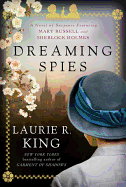 Last year's California Bookstore Day was such a rousing success that the idea is going national this year, on May 2. At "All About Independent Bookstore Day" yesterday at the Winter Institute in Asheville, N.C., Pete Mulvihill of Green Apple Books in San Francisco--the store that hatched the idea of California Bookstore Day--asked panelists to talk about what worked last year and what didn't. Samantha Schoech, who is producing both Independent Bookstore Day and California Bookstore Day (the events are the same, but bookstores in California will retain the original name this year), emphasized that the final deadline for booksellers to order the exclusive IBD merchandise is tomorrow, February 11, at noon. The deadline, she explained, is because they produce only enough items to fill orders.
Last year's California Bookstore Day was such a rousing success that the idea is going national this year, on May 2. At "All About Independent Bookstore Day" yesterday at the Winter Institute in Asheville, N.C., Pete Mulvihill of Green Apple Books in San Francisco--the store that hatched the idea of California Bookstore Day--asked panelists to talk about what worked last year and what didn't. Samantha Schoech, who is producing both Independent Bookstore Day and California Bookstore Day (the events are the same, but bookstores in California will retain the original name this year), emphasized that the final deadline for booksellers to order the exclusive IBD merchandise is tomorrow, February 11, at noon. The deadline, she explained, is because they produce only enough items to fill orders.
The mission, Schoech said, is not just to sell the 16 exclusive books and gift items--ranging from chapbooks, broadsides and prints to literary-themed tea towels and onesies--it's "to celebrate our collective success, to remind people that bookstores are vibrant and vital, and part of the community, and most of all, to have fun." The items are "carefully curated, items we hope will work across the country."
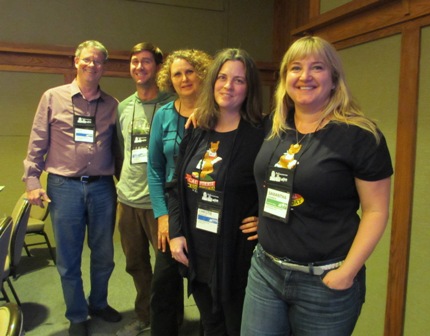 |
| L.-r.: Hut Landon, Pete Mulvihill, Ann Seaton, Christine Day and Samantha Schoech. |
Christine Olson Day, from Gallery Bookshop and Bookwinkle's Children's Books in Mendocino, Calif., said, "Our community isn't particularly Internet-driven, so we really ran with the party theme to draw customers. Our tagline was: 'What if you and all your bookloving friends went shopping on the same day?' We planned a food/drink giveaway for each hour of the day, and 10 parties throughout the day. People came in, got the concept and joined in--and they stayed for a long time. This year, though, we'll go with three parties."
Ann Seaton, Hicklebee's Children's Books, San Jose, Calif., recalled, "We had authors, but we wanted to do more. We handmade scratch-off lottery tickets and gave away galleys and remainders for adults and kids." Early promotion is key, she stressed. "We featured the items in advance on our website and in our newsletters." On the day, the store limited customers to one each of each item to avoid sellouts immediately.
Mulvihill's goal in promoting California Bookstore Day was to have a line outside the door--and he succeeded: "We had 25-20 people waiting for the store to open--so we bought them doughnuts." Green Apple had events throughout the day, including a taco truck, a keg donated by a local brewery, author Dave Eggers giving relationship advice, a scavenger hunt and live music. Green Apple, too, initially limited the quantities customers could purchase.
Hut Landon, executive director of the Northern California Independent Booksellers Association, noted that the stores that were most successful did what they do well. "It can be whatever you want to do, it's for your customers," he said. "Think of it as a party, not an event."
Independent Bookstore Day is being produced out of NCIBA, with financial assistance from ABA. They've hired a marketing firm to get the word out to the media, but are counting on bookstores to get the word to their customers and communities. To facilitate that, IBD is providing press release templates, high-resolution images of the items and plenty of promotional material at indiebookstoreday.com. Regional booksellers associations will also be sending material to stores. All of the panelists emphasized the importance of using social media to reach out to customers and authors. Independent Bookseller Day is on Twitter and Facebook.
Day suggested sending invitations to customers, asking them to come to the party and bring two friends. This year, she said, "We'll promote the items more heavily and further in advance. We want a line outside our store, too." --Robin Lenz
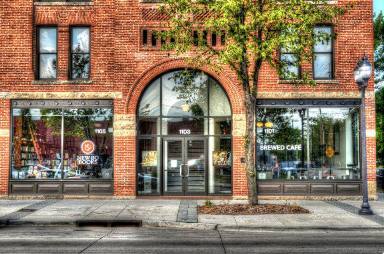 Next month, Deb Witte will become the owner of New Bo Books, Cedar Rapids, Iowa. On the bookstore's website, Mary Ann Peters, who opened the shop in 2012 as a division of Iowa City's Prairie Lights, wrote: "Wonderful news! Expect good things to continue at New Bo Books! Beginning March 1, Deb Witte is taking the bookstore into her capable hands, and we are excited for her to lead New Bo Books into the future! A seamless transition is planned so you can continue to enjoy your experience at New Bo Books."
Next month, Deb Witte will become the owner of New Bo Books, Cedar Rapids, Iowa. On the bookstore's website, Mary Ann Peters, who opened the shop in 2012 as a division of Iowa City's Prairie Lights, wrote: "Wonderful news! Expect good things to continue at New Bo Books! Beginning March 1, Deb Witte is taking the bookstore into her capable hands, and we are excited for her to lead New Bo Books into the future! A seamless transition is planned so you can continue to enjoy your experience at New Bo Books."






 Last year's California Bookstore Day was such a rousing success that the idea is going national this year, on May 2. At "All About Independent Bookstore Day" yesterday at the Winter Institute in Asheville, N.C., Pete Mulvihill of Green Apple Books in San Francisco--the store that hatched the idea of California Bookstore Day--asked panelists to talk about what worked last year and what didn't. Samantha Schoech, who is producing both Independent Bookstore Day and California Bookstore Day (the events are the same, but bookstores in California will retain the original name this year), emphasized that the final deadline for booksellers to order the exclusive IBD merchandise is tomorrow, February 11, at noon. The deadline, she explained, is because they produce only enough items to fill orders.
Last year's California Bookstore Day was such a rousing success that the idea is going national this year, on May 2. At "All About Independent Bookstore Day" yesterday at the Winter Institute in Asheville, N.C., Pete Mulvihill of Green Apple Books in San Francisco--the store that hatched the idea of California Bookstore Day--asked panelists to talk about what worked last year and what didn't. Samantha Schoech, who is producing both Independent Bookstore Day and California Bookstore Day (the events are the same, but bookstores in California will retain the original name this year), emphasized that the final deadline for booksellers to order the exclusive IBD merchandise is tomorrow, February 11, at noon. The deadline, she explained, is because they produce only enough items to fill orders.
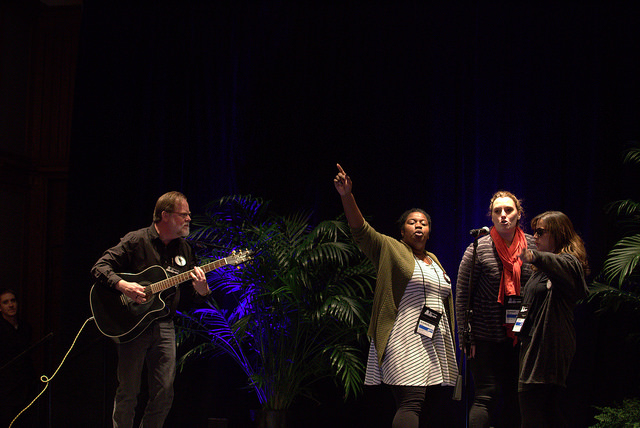
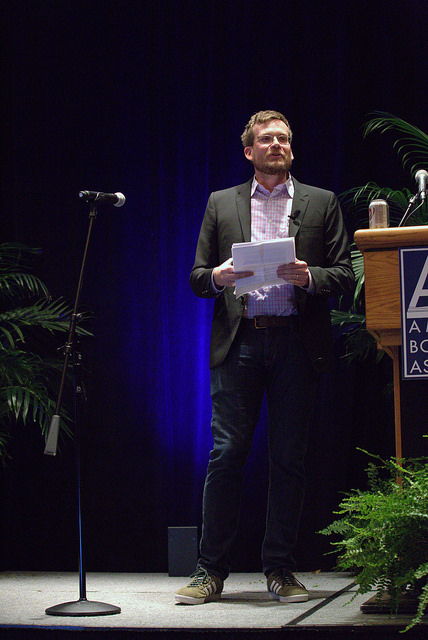
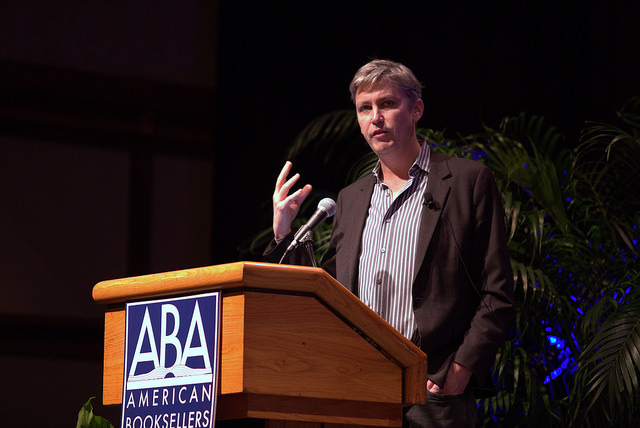
 Fasten your seatbelts.
Fasten your seatbelts.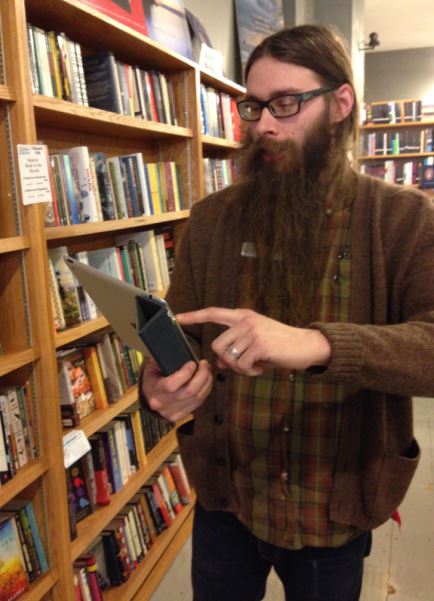
 A Spool of Blue Thread
A Spool of Blue Thread Since 1994, when Laurie R. King introduced Mary Russell in The Beekeeper's Apprentice, readers have enjoyed Russell's unusual partnership with Sherlock Holmes. Brilliant and idiosyncratic, Russell has proved a worthy match for Holmes both personally and professionally, as the couple has tackled cases on three continents. In Dreaming Spies, her 13th novel featuring the duo, King delves into an episode in their lives long shrouded in mystery: a three-week sojourn in Japan in 1924.
Since 1994, when Laurie R. King introduced Mary Russell in The Beekeeper's Apprentice, readers have enjoyed Russell's unusual partnership with Sherlock Holmes. Brilliant and idiosyncratic, Russell has proved a worthy match for Holmes both personally and professionally, as the couple has tackled cases on three continents. In Dreaming Spies, her 13th novel featuring the duo, King delves into an episode in their lives long shrouded in mystery: a three-week sojourn in Japan in 1924.